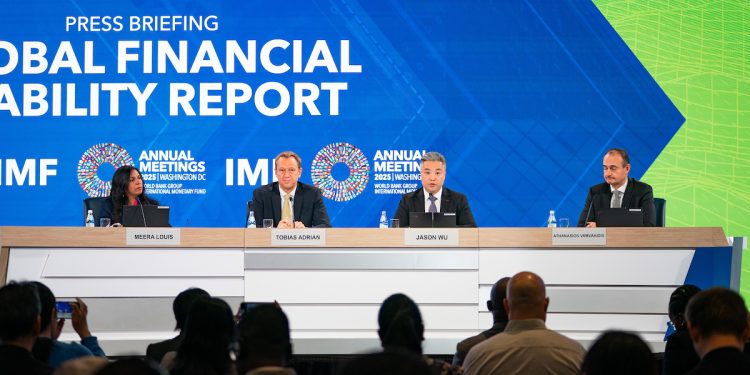- From Cyber to Settlement: The Unseen Fault Lines in Africa’s FX Plumbing
When the foreign-exchange (FX) market works, it is invisible, a constant hum beneath global commerce. But as the IMF’s October 2025 Global Financial Stability Report notes, what lies beneath that hum is now far from stable. The report paints a picture of a global FX system whose pipes are expanding faster than its safety valves. Liquidity is deeper, but also more brittle; cyber risks are climbing; and settlement exposures, the trillions of dollars that pass hands without simultaneous payment, remain “a fault line that could fracture under stress.”
For African economies like Ghana, Kenya, and Nigeria, where small FX markets rely on a handful of banks and clearing agents, these global tremors could magnify into domestic quakes.
The Quiet Risk in an Invisible Market
The IMF estimates that foreign-exchange trading volumes now exceed $7.5 trillion per day, up from $6.6 trillion in 2019. Yet much of this growth has come through non-bank intermediaries and electronic platforms whose operational safeguards vary widely.
Roughly one-third of daily turnover is still exposed to settlement risk, meaning one party delivers currency without simultaneously receiving the other. the FX world’s equivalent of a handshake in the dark.
In advanced markets, systems like CLS Bank (Continuous Linked Settlement) offer protection by settling trades across currencies in real time. But most African currencies, including the Ghanaian cedi, are outside these nets. That leaves transactions to depend on correspondent banks, manual reconciliation, and a patchwork of local payment systems that can buckle during volatility or cyberattack.
“Africa’s FX architecture still runs on trust and time zones,” one Ghanaian bank treasurer tells NorvanReports. “When a counterparty delays settlement by a few hours, it can freeze liquidity across the market.”
Ghana’s Dollar Pulse
Ghana’s FX market, where daily interbank turnover hovers, may seem small compared to global peers, but it is disproportionately vital. The cedi’s stability shapes everything from inflation expectations to government financing costs. Yet behind each transaction lies a tangle of manual approvals, delayed confirmation messages, and exposure to global payment corridors that run through New York or London.
The Bank of Ghana (BoG) has made strides in transparency, publishing daily FX reference rates and expanding electronic trading platforms. But settlement remains largely bilateral, meaning the system’s reliability rests on the operational and cyber resilience of a few key institutions.
The IMF report warns that “disruptions in non-CLS markets could cascade across payment and funding channels, amplifying stress in emerging markets.”
That risk is no longer theoretical. In 2022, a major West African commercial bank suffered a 24-hour system freeze due to a ransomware attack, delaying FX settlements across three countries.
Cyber Risk Meets Liquidity Risk
Cyber resilience has become a macroeconomic variable. Modern FX trading depends on a mesh of digital platforms, brokers, and SWIFT messaging. A single intrusion can paralyse flows. The IMF calls cyberattacks “a shock with liquidity characteristics”, not just stealing data but freezing market confidence and funding.
Ghana’s banks have reported a rising frequency of attempted intrusions. The BoG’s Cybersecurity Directive, introduced in 2018 and updated in 2024, mandates real-time incident reporting and independent security audits. Yet enforcement capacity lags behind the sophistication of global threat actors.
Across Africa, the problem is scale. Many central banks lack redundant settlement pathways or cross-border cyber coordination frameworks. When an attack disables one system, participants scramble for alternatives, often reverting to slower manual processes that compound liquidity pressures.
“In FX markets, time is capital,” says a Nairobi-based dealer. “If you lose connectivity for an hour, you lose credibility for a week.”
Thin Markets, Thick Risks
Beyond cyber threats, structural issues deepen the risk. African FX markets are notoriously concentrated; a handful of banks handle most trades, and offshore liquidity is scarce. That makes spreads wide and volatility self-reinforcing: when uncertainty spikes, liquidity evaporates, worsening the price swings.
The IMF highlights that “FX stress can transmit into other asset classes, equities, sovereign bonds, and derivatives, tightening financial conditions even in the absence of macro shocks.” Ghana’s experience in late 2022, when offshore investors dumped local bonds and the cedi depreciated by nearly 60%, remains a case study in this feedback loop.
Today, while reserves have recovered above $6 billion, the underlying microstructure has not changed much. Dealers still depend heavily on the central bank’s window, and the interbank market remains shallow.
Without broader participation, such as corporates, exporters, and fintech market-makers, liquidity will continue to depend on the same few players whose own funding depends on government debt.
The Settlement Gap
A particularly urgent challenge is payment-versus-payment (PvP) adoption, the simultaneous exchange of currencies to eliminate settlement risk.
Only about 40 percent of global FX transactions are currently PvP-settled, mostly through CLS. In Africa, that share is below 10 percent.
The IMF calls for regional PvP solutions that could bring local currencies like the cedi, naira, and shilling into safer networks. Initiatives under the Pan-African Payment and Settlement System (PAPSS) are a first step but remain limited to trade payments, not capital-market FX trades.
Until that gap closes, African FX markets will remain “manual-risk” systems in an algorithmic age.
Why It Matters for Ghana’s Economy
Every flaw in the FX plumbing carries fiscal and corporate consequences. When liquidity dries up or settlement delays occur, the cost of hedging and import financing spikes.
For a country like Ghana, dependent on imported fuel, medicines, and industrial inputs, this can feed directly into inflation and fiscal stress.
Moreover, persistent settlement risk discourages foreign participation, raising borrowing costs. Investors demand higher yields to compensate for operational uncertainty, a hidden tax on capital inflows.
In short, weak FX infrastructure isn’t just a technical issue. It’s a drag on competitiveness.
The policy remedies are both technical and institutional, which are not limited to my country, Ghana, and its peers should lobby for inclusion in global CLS nets or build regional alternatives integrated with PAPSS, which already exists in the African context. We must also immediately start what I call the enhanced cyber supervision which where the governments mandate red-team testing and cross-border incident drills among banks and central banks.
I also recommend broadening the dealer base, which encourages corporate treasuries and fintechs to act as secondary market participants to deepen liquidity, plus making sure that there is data transparency a move to publish anonymised FX transaction data to improve price discovery and reduce panic-driven hoarding.
Finally, the regional cooperation among nations in the region, especially Africa, I think the IMF and African Development Bank could co-fund a continental “FX Stability Facility” to provide liquidity during disruptions.
“Liquidity is not a given, it’s engineered,” says an Accra-based economist. “We must design systems that survive both hackers and headlines.”
Africa’s FX systems are the arteries of its economies. Yet they remain fragile, narrow, and often opaque, one cyberattacks, one settlement failure, or one misplaced algorithm away from paralysis.
Ghana’s own experience shows progress: the cedi is more stable, the central bank is more transparent, and digital trading is more common. But the plumbing beneath it all, the cables, code, and clearinghouses, remains unfinished.
Until that changes, Africa’s currencies will continue to rest on faith as much as on fundamentals.
De-risking finance isn’t only about budgets and bonds; it’s about the invisible code that moves money across borders. In that code, the next African financial crisis may already be hiding.








